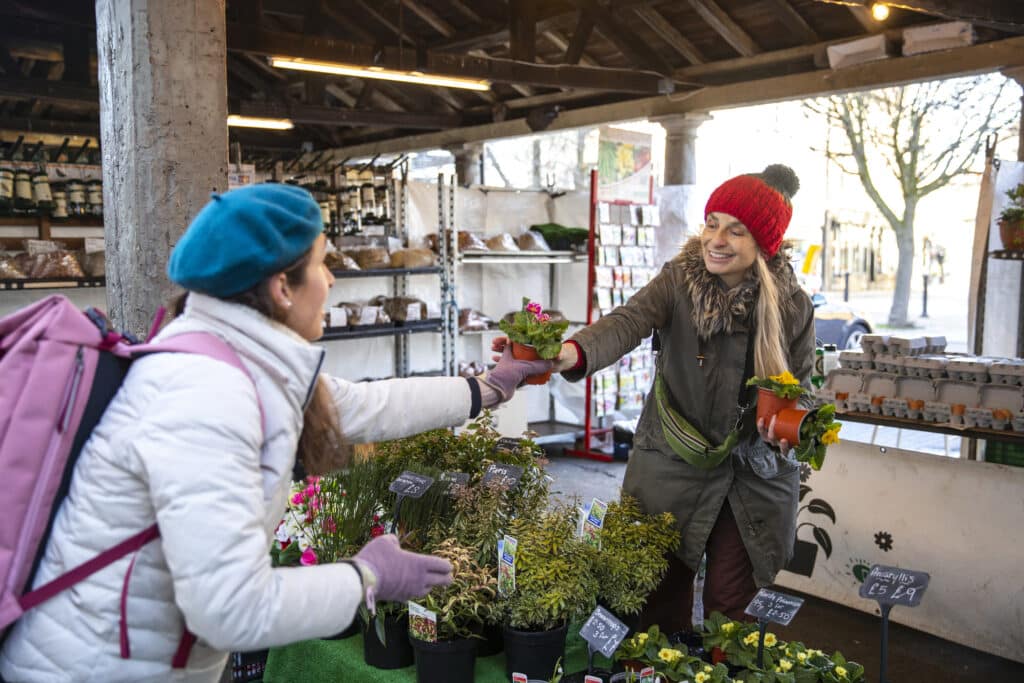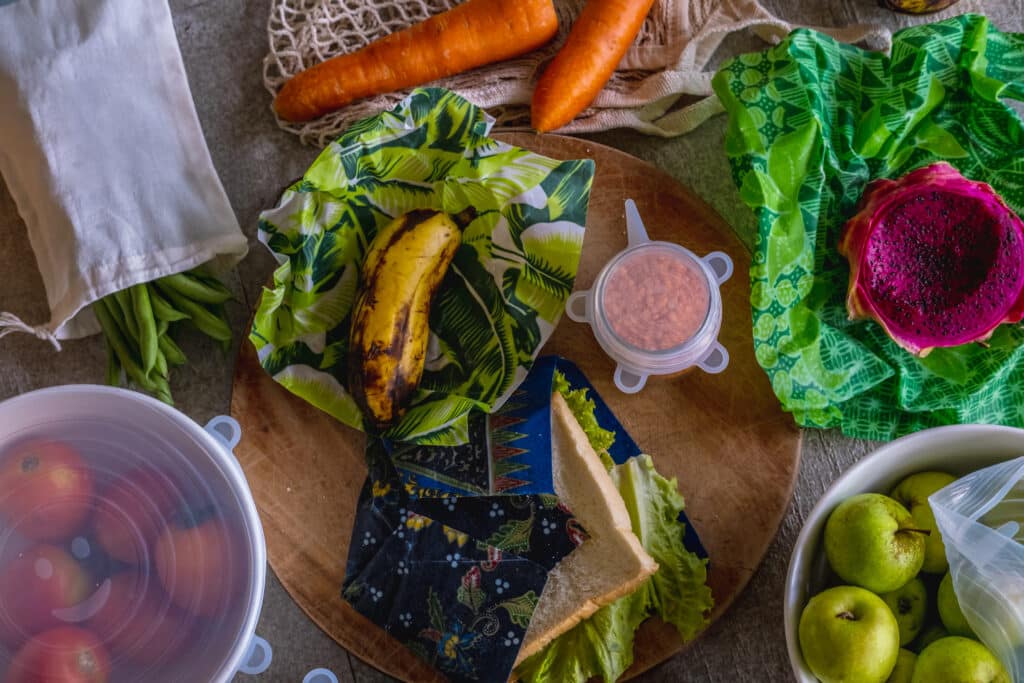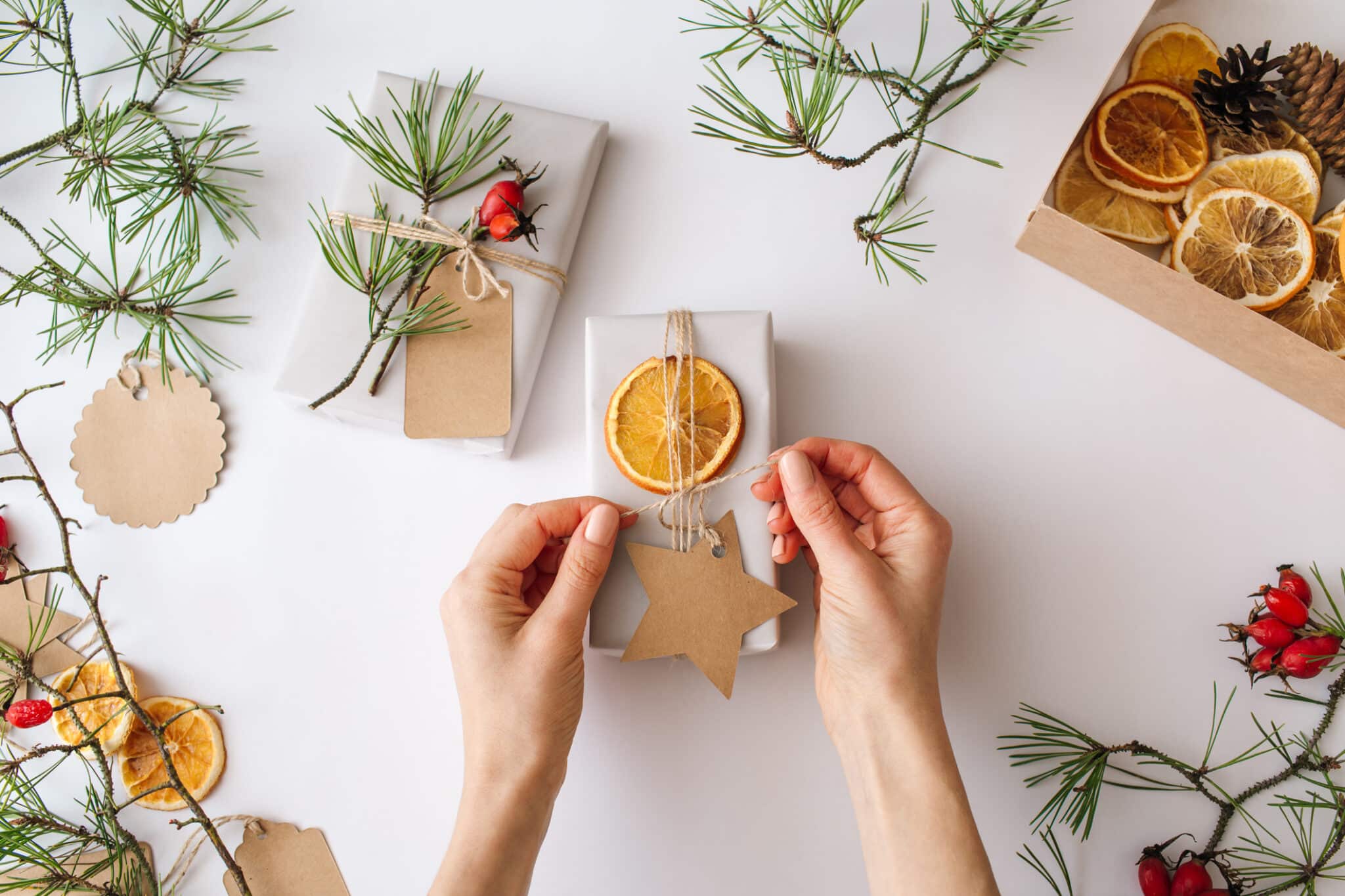Products You May Like
Around the holidays, we buy a lot more stuff. $886.7 billion worth of stuff, in fact.
The gift-giving tradition is meant to help show our appreciation and care for our loved ones, but it often comes at a cost to the environment. We know that consumerism plays a direct role in climate change, and our holiday habits are no exception. Not to mention, $9.5 billion is spent every year on unwanted gifts, representing a huge waste of money and resources. Luckily, gifting sustainably doesn’t mean giving presents that are less exciting or meaningful. Here’s how to get started.
Shop Local

The environmental impact of an object isn’t determined only by the materials it’s made of, but also by all of the processes that went into manufacturing, packaging, and shipping it to you. Shipping in particular is a troubling source of climate pollution: a new report finds that imports from just four of the U.S.’s major retail companies generated 20 million metric tons of carbon dioxide emissions in two years, which equates to roughly the same emissions as 5 coal-fired power plants.
Buying holiday gifts from local businesses cuts out some of these major shipping-related emissions. Local food products are a good place to start – like nearby farms that make honey, jam, or other preserved products from their crops – as well as local artists. Instead of ordering a scarf online, see if you can find a local vendor who knits winter-weather clothing themselves.
Give Experiences
Gift-giving isn’t limited to just physical objects! Consider what experiences or non-physical presents you can surprise a friend, partner, or family member with. Give the gift of a yearly membership or a day pass to a nearby museum, botanical garden, or National or State Park; a gift card for an indoor activity like rock climbing, skydiving, or an escape room; movie or concert tickets; a voucher for a massage session or a spa day; an online or in-person class on something they’re interested in (Masterclass has tons of great options), like ceramics or cooking; or a year-long subscription to an app (like Audible or a language-learning app). You can make these experiences yourself too: take them for dinner or drinks somewhere that they’ve wanted to go, or plan an itinerary for a day/weekend trip. You’ll probably find that these gifts end up being more meaningful than something from a store.
Learn More About Solar Energy From EcoWatch
Plan Out Purchases
Start brainstorming gifts early so you don’t find yourself scrambling and buying things without giving them much thought. Think about things that will be useful, meaningful, and appreciated by the one receiving it. Planning early will also help you keep expenses down and save on things like faster shipping (especially air shipping), which is both costly and unsustainable.
Give Gifts for Sustainable Living

Give the gift of sustainability this year – especially to friends and family who might not incorporate many sustainable practices into their day-to-day lives. Think of products that might help them reduce waste: a set of reusable silicone bags for food, an insulated water bottle or thermos, reusable produce bags, a roll of washable “paper” towels, Furoshiki wrapping fabric for future gift-giving, or a plant or indoor herb garden for year-round use (and maybe some instructions on how to take care of them, for those with not-so-green thumbs). Go the experience/non-material route as well by giving a CSA so your produce-loving friends can enjoy fresh vegetables during the growing season.
Ask for Wishlists
While it might feel weird to ask, it’s better to know what someone wants than to get them something they’ll never use. Websites like Elfster make this easier: users can add items they’re wishing for, and other participants can mark if they’ve purchased it in order to avoid duplicates. Although, a simple emailed list also works.
If not a wishlist, give some more pointed attention to what a friend or family member is interested in in the months leading up to the holiday – chances are, they’ll drop some clues!
Thrifty Gifting
Who says gifts have to be brand new? Check out thrift stores and vintage shops for pre-loved items like unique glassware and kitchen items, a cool jacket or sweater, jewelry, frames, home decor, or used books. Thrifting also takes some of the financial stress off of the holiday, and is a great way to shop for gift exchanges with a price limit, or swaps like White Elephant.
Buy From Sustainable Companies

Before paying for your cart, consider the company you’re buying from. Do they have an ethic of sustainability? Do they provide clear information about their practices? Transparency is often an indicator of companies that are truly making strides and prioritizing sustainability, as are goals for both the short- and long-term – in other words, not just a vague commitment to going carbon-neutral by 2050. In general, a sustainable company will source materials ethically, have conscious manufacturing processes, package their products sustainably, make efforts to reduce emissions, give charitable contributions to environmental groups, or have programs in place for recycling or repairing products.
Certifications are also a good way to determine sustainability. A B Corp Certification is a measure of a company’s social and environmental impact, for one. Some businesses also join an effort called 1% for the Planet, which means they’ve pledged 1% of their total revenue to environmental nonprofits. Patagonia’s founder Yvonne Chouinard was a co-founder of 1%, and has since donated non-voting shares of the company to an environmental nonprofit. With their lifetime return and repair program, and use of primarily recycled materials (among other efforts), Patagonia is an example of a company committed to sustainability, and they have great gifts in a range of prices. Other 1% for the Planet companies include Klean Kanteen, Kind Coffee, and Stasher.
Of course, be wary of greenwashing when vetting companies; many will use images or verbiage that imply sustainability when in actuality, they do little to mitigate their environmental impact.
Go for Quality, Not Quantity
Another benefit of buying from sustainable companies is buying items that’ll last longer. Unfortunately, products in many sectors aren’t made to last: electronics have predetermined periods of usefulness, fast-fashion clothing brands are making cheaper garments, and the quality of home goods is often low to keep prices down. Rather than use your gift budget to buy someone multiple, low-quality items, put that money instead towards purchasing one high-quality thing that’ll last a long time. For clothing, try Pact, tentree, VETTA (which specializes in “capsule” wardrobes), Girlfriend Collective, Organic Basics, and Allbirds.
